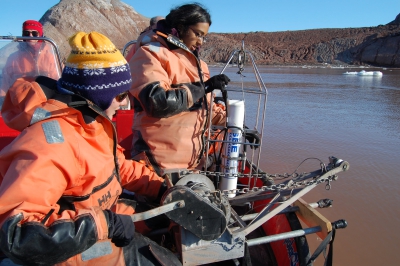
Panel Discussion & Complimentary Bag Lunch
In Coordination with the POLAR2018 Conference
Contact: Sandy Starkweather, sandy.starkweather [at] noaa.gov
Organizers: Sandy Starkweather, Renuka Badhe, Sara Bowden, Allen Pope
This lunch panel discussion, with complimentary bag lunch, will explore the accomplishments, challenges, quality of work experiences, insights, recommendations, and prospects for women in polar research. Participation will be limited to the first 275 registrants.
All attendees of POLAR2018 are welcome and participation is free. Please be sure to wear your POLAR2018 conference badge to verify you are a conference participant. More details and registration is below.
Agenda
12:30: Gathering Lunches/Finding Places
12:40: Welcome from Organizers, Thanks to sponsors, Context (Starkweather)
12:55: Moderated Panel Discussion – From Entering the Field to Taking the Helm, Perspectives of Women in Polar Research
Moderator: Hannah Hoag, Independent Journalist
Panelists:
Susan Barr, International Arctic Science Committee (IASC)
Chandy Nath, Scientific Committee on Antarctic Research (SCAR)
Morgan Seag, Cambridge University
HongKum Lee, Korea Polar Research Institute (KOPRI)
Colleen Strawhacker, National Snow & Ice Data Center (NSIDC)
13:55: Next Steps and Thanks
Background
New research findings are shaping our understanding of the issues that women face in technical fields, particularly those with strong connections to fieldwork. Concerns include a deficit of female leadership due to the so-called "leaky pipeline" (e.g., Goulden et al., 2011), a lack of safety and inclusivity at field locations (Clancy et al., 2014; Nelson et al., 2017), and explorations of ways in which research agendas have discounted contributions of women (e.g., Carey et al. 2016).
In spite of historical barriers to participation in polar field work, women have made outstanding contributions to polar physical, biological and social sciences, as well as to community-level efforts to coordinate and communicate science. In the past decade, women have stepped into leadership roles at polar institutions. Yet evidence of persistent challenges, reflected both in academic studies and media reports (see Further Resources, below), compels us to examine the sources of those challenges and to explore solutions to ensure a bright future for all those who wish to engage in polar research.
A panel discussion featuring a cross-section of women* engaged in and with polar research is planned for Polar 2018. The panel will explore the accomplishments, challenges, quality of work experiences, insights, recommendations, and prospects for women in polar research. This panel discussion is open to all registered attendees of Polar 2018 (gender inclusive, space limited). Panelist perspectives will range across career levels, identities, professional specialties, and poles of interest. Topics on the agenda include achieving inclusivity in polar research, opportunities for networking and mentorship, and how gender inclusivity influences the quality of polar research and research experiences. The panelists will reflect upon ways to support women in polar research now and in the future.
*The organizers recognize that gender is non-binary and that concerns for non-binary people may intersect and be relevant with much of this discussion.
Sponsors
International Arctic Science Committee, Tinker Muse Prize, Arctic Research Consortium of the United States, United States Arctic Research Commission, International Association of Cryospheric Sciences, Antarctic and Southern Ocean Coalition, International Glaciological Society, Ocean Expeditions, Ltd., Anonymous Private Donor
References
Carey, M., Jackson, M. Antonello, A. Rushing, J. 2016. Glaciers, gender, and science: A feminist glaciology framework for global environmental change research. Progress in Human Geography. Vol 40, Issue 6, pp. 770 – 793. https://doi.org/10.1177/0309132515623368
Clancy, K., Nelson, R., Rutherford, J., Hinde, K. 2014. Survey of Academic Field Experiences (SAFE): Trainees Report Harassment and Assault. Plos One. https://doi.org/10.1371/journal.pone.0102172
Goulden, M., Mason, M.A., Frasch, K. 2011. Keeping Women in the Science Pipeline. The ANNALS of the American Academy of Political and Social Science. Vol 638, Issue 1, pp. 141 – 162. https://doi.org/10.1177/0002716211416925
Nelson, R., Rutherford, J., Hinde, K., Clancy, K. 2017. Signaling Safety: Characterizing Fieldwork Experiences and Their Implications for Career Trajectories. American Anthropologist. Vol 119, Issue 4, pp. 710-722. https://doi.org/10.1111/aman.12929
Further Resources
2017 Aquatic Sciences Meeting Plenary by Marcia McNutt, "Welcoming All to the Field":
https://news.brown.edu/articles/2017/09/harassment
https://www.washingtonpost.com/news/speaking-of-science/wp/2017/10/10/a…
https://meltingplanet.org/2018/01/24/creating-gender-balance-at-academi…
Gender Representation of Speaking Opportunities at the American Geophysical Union Fall Meeting
US Congressional Committee on Science, Space and Technology. Hearing on Sexual Harassment and Misconduct in the Sciences: &authuser=0
Resources/Networks
https://www.facebook.com/WomeninPolarScience/
https://earthzine.org/2017/05/23/lessons-from-the-earth-science-womens-…
http://journals.ametsoc.org/doi/abs/10.1175/BAMS-D-15-00040.1
https://500womenscientists.org/
Other
https://eos.org/opinions/gender-diversity-cryosphere-science-awards
Glaciers, Gender, and Science: We Need More Stories of Ice. | M Jackson | TEDxMiddlebury
